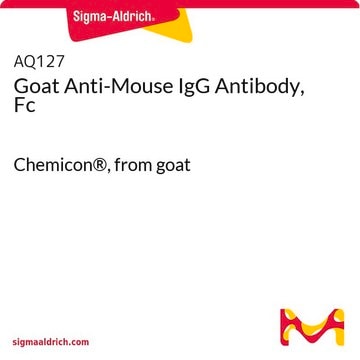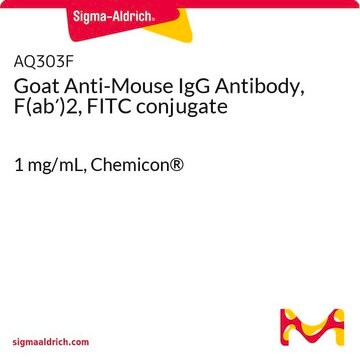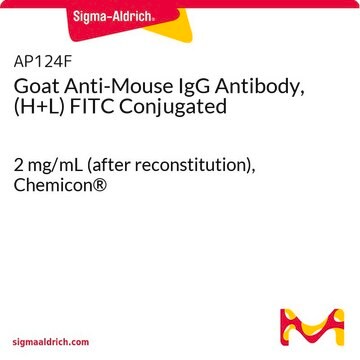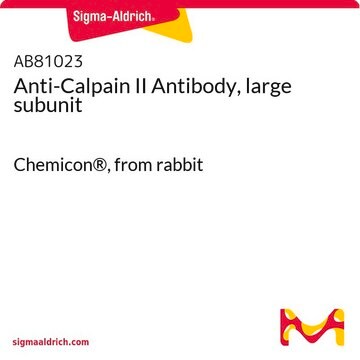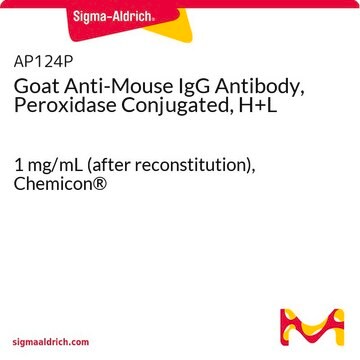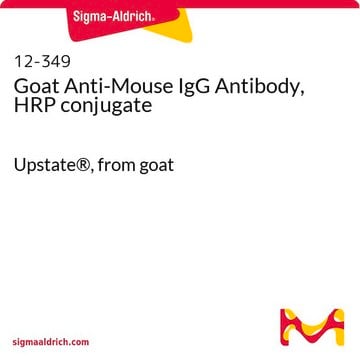AP130F
Goat Anti-Mouse IgG & IgM Antibody, FITC conjugate
Chemicon®, from goat
Sign Into View Organizational & Contract Pricing
All Photos(1)
About This Item
UNSPSC Code:
12352203
eCl@ss:
32160702
NACRES:
NA.46
Recommended Products
biological source
goat
Quality Level
conjugate
FITC conjugate
antibody form
F(ab′)2 fragment of affinity isolated antibody
antibody product type
secondary antibodies
clone
polyclonal
species reactivity
mouse
manufacturer/tradename
Chemicon®
technique(s)
immunofluorescence: suitable
shipped in
wet ice
target post-translational modification
unmodified
Related Categories
Application
Detect Mouse IgG & IgM using this Goat anti-Mouse IgG & IgM Antibody, FITC conjugate validated for use in IF.
Research Category
Secondary & Control Antibodies
Secondary & Control Antibodies
Research Sub Category
Whole Immunoglobulin Secondary Antibodies
Whole Immunoglobulin Secondary Antibodies
Legal Information
CHEMICON is a registered trademark of Merck KGaA, Darmstadt, Germany
Disclaimer
Unless otherwise stated in our catalog or other company documentation accompanying the product(s), our products are intended for research use only and are not to be used for any other purpose, which includes but is not limited to, unauthorized commercial uses, in vitro diagnostic uses, ex vivo or in vivo therapeutic uses or any type of consumption or application to humans or animals.
Not finding the right product?
Try our Product Selector Tool.
Hazard Statements
Precautionary Statements
Hazard Classifications
Aquatic Chronic 3
Storage Class Code
11 - Combustible Solids
WGK
WGK 3
Certificates of Analysis (COA)
Search for Certificates of Analysis (COA) by entering the products Lot/Batch Number. Lot and Batch Numbers can be found on a product’s label following the words ‘Lot’ or ‘Batch’.
Already Own This Product?
Find documentation for the products that you have recently purchased in the Document Library.
Yanchun Liu et al.
Experimental and therapeutic medicine, 18(5), 3281-3290 (2019-10-12)
Protein kinase C type δ (PKCδ) is involved in B-cell signaling and the regulation of growth, apoptosis and differentiation of a variety of cell types. Cell division cycle 25 (Cdc25) is a key mediator of cell cycle progression that activates
Shu Fang et al.
Cells, 13(5) (2024-03-13)
Developmental pluripotency-associated 2 (DPPA2) and DPPA4 are crucial transcription factors involved in maintaining pluripotency in humans and mice. However, the role of DPPA2/4 in bovine extended pluripotent stem cells (bEPSCs) has not been investigated. In this study, a subset of
Jianli Ma et al.
Experimental and therapeutic medicine, 23(4), 273-273 (2022-03-08)
Osteoporosis (OP) is a systemic metabolic bone disease that occurs most frequently in the elderly. The main pathogenesis of OP is excessive proliferation and differentiation of osteoclasts, in which the peroxisome proliferator-activated receptor γ (PPARγ) pathway has a pivotal role.
Di Xie et al.
Journal of neuroinflammation, 17(1), 57-57 (2020-02-18)
Microglia activation is associated with the development of hypoxic-ischemic brain injury (HIBI). Neuroinflammation suppression might be a suitable therapeutic target in hypoxic oligodendrocyte injury. This study aims to determine whether clemastine can improve hypomyelination by suppressing the activated microglia and
Dao-Rong Hou et al.
Scientific reports, 6, 25838-25838 (2016-05-14)
Efficient isolation of embryonic stem (ES) cells from pre-implantation porcine embryos has remained a challenge. Here, we describe the derivation of porcine embryonic stem-like cells (pESLCs) by seeding the isolated inner cell mass (ICM) from in vitro-produced porcine blastocyst into
Our team of scientists has experience in all areas of research including Life Science, Material Science, Chemical Synthesis, Chromatography, Analytical and many others.
Contact Technical Service